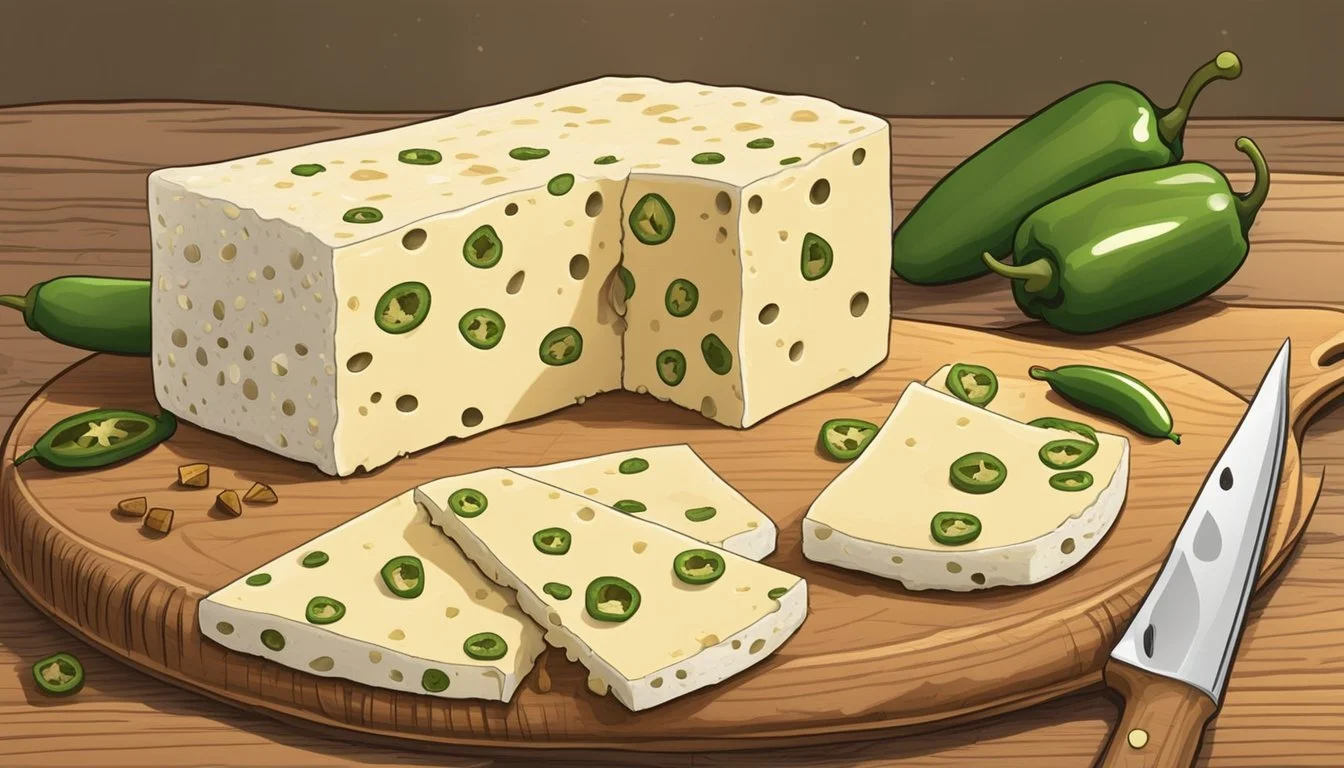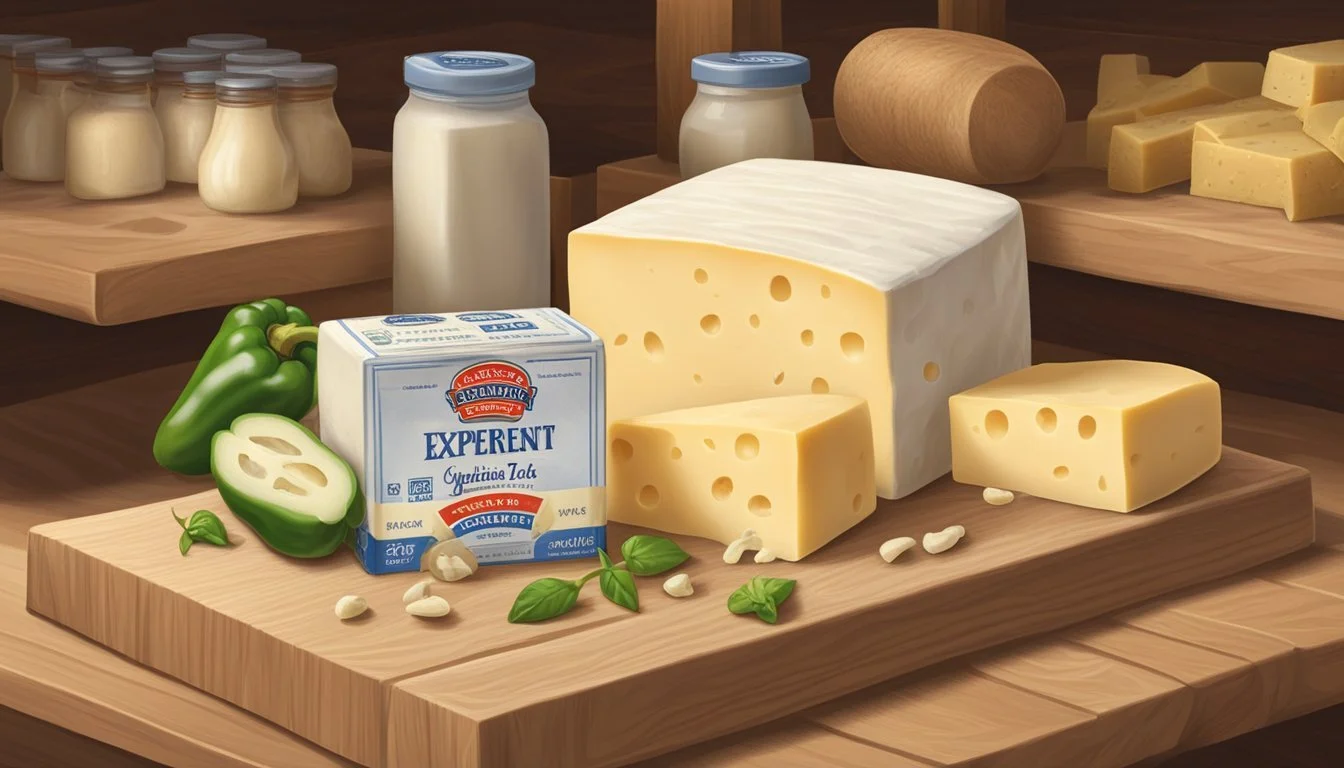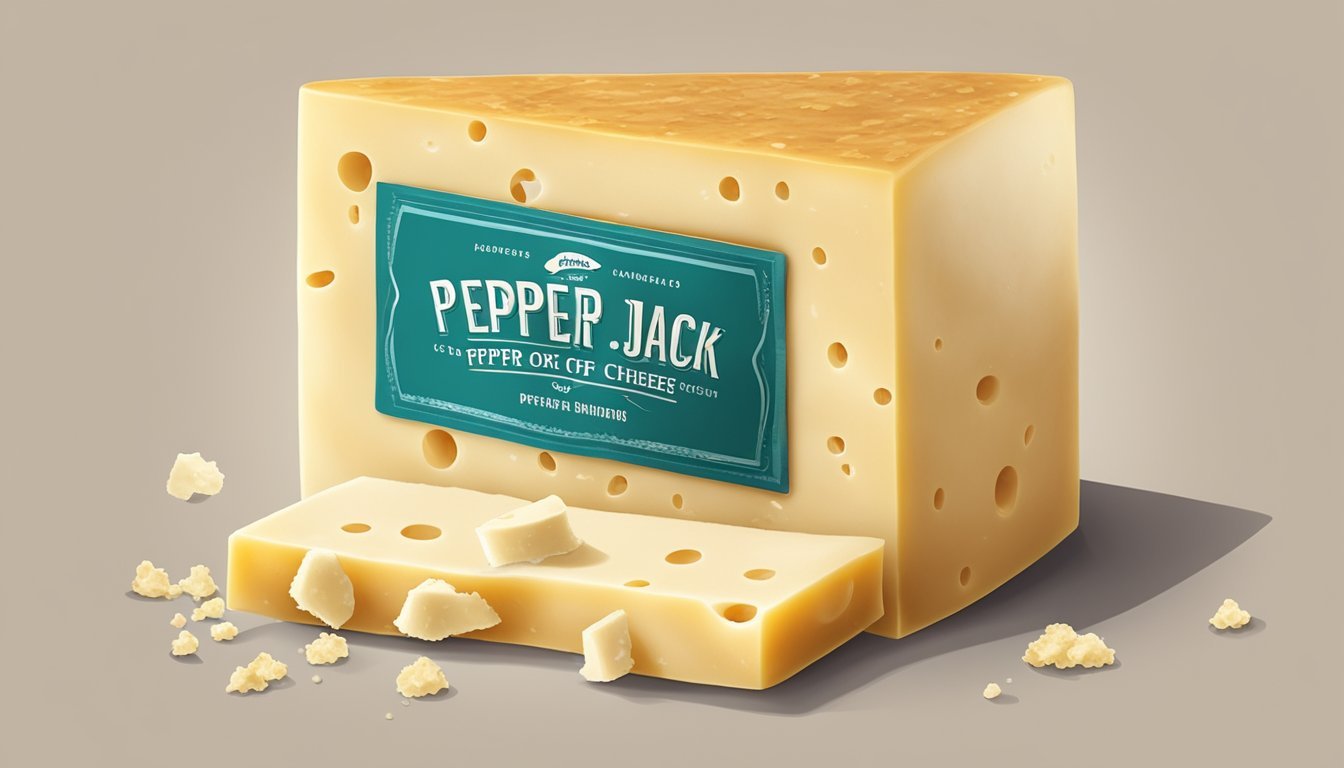How Long Does Pepper Jack Cheese Last?
Shelf Life and Storage Tips
Pepper jack cheese (What wine goes well with cheese?) is a versatile favorite known for its spicy flavor and semi-soft texture that adds a zesty kick to a variety of dishes. Whether it's melted into quesadillas, crumbled over nachos, or adding flavor to burgers, omelets, sandwiches, tacos, mac and cheese, soups, or casseroles, the boldness of pepper jack cheese enhances the taste experience. The shelf life of this cheese, as with many dairy products, is a topic of interest for both culinary professionals and household cooks who aim to prevent food waste while ensuring safety and taste.
The longevity of pepper jack cheese in the kitchen is influenced by storage conditions and whether the cheese is opened or unopened. When stored properly in the refrigerator at temperatures at or below 40°F, unopened pepper jack cheese typically remains in good quality for up to two months past its sell-by date. Once the package is opened, it's best to consume the cheese within three to four weeks to enjoy its optimal flavor and texture. In scenarios where the cheese cannot be used promptly, freezing may be an option, although this could slightly affect its texture.
Understanding Pepper Jack Cheese
Pepper Jack cheese is renowned for its creamy texture and spicy kick, attributes that stem from its blend of Monterey Jack cheese and fiery chili peppers. The cheese's preservation and shelf life are closely tied to these qualities.
Characteristics
Pepper Jack cheese stands out in the cheese family due to its spicy flavor profile, attributed to the incorporation of various spicy peppers such as jalapeños, habaneros, or serranos into the Monterey Jack cheese. It's a semi-soft cheese with a moisture content that is higher than hard cheeses like Gouda but lower than soft cheeses (What wine goes well with soft cheeses?) like Mozzarella, leading to a unique texture that is creamy yet firm. The moisture also plays a crucial role in determining the cheese's perishability and storage requirements.
Varieties
Differences in Pepper Jack cheese varieties mainly arise from the type of spicy peppers used and the aging process. Commonly used peppers include:
Jalapeño Peppers: for a milder heat
Habanero Peppers: for a robust spice level
Serrano Peppers: for a sharp, distinct flavor
These peppers are mixed into the Monterey Jack, a derivative of Jack cheese, which is known for its mild taste and slight sweetness. Although not as hard as cheeses like Gouda, Pepper Jack is firmer than soft cheeses such as American cheese or fresh Mozzarella. This cheese is predominately sold in blocks or slices and doesn't have the aged character of hard cheeses, which contributes to its shorter shelf life.
Shelf Life Fundamentals
Understanding the shelf life fundamentals of Pepper Jack cheese is crucial for maintaining its flavor and safety. The shelf life can vary depending on storage conditions and whether the cheese is opened or unopened.
Expiration Date
The expiration date on Pepper Jack cheese indicates the point at which the manufacturer can no longer guarantee the product's peak quality. It's important to note that it may still be safe to consume the cheese after this date has passed, especially if it has been refrigerated properly.
Sell-by Date
A sell-by date, often found on cheese packaging, is intended for retailers and informs them of the date by which the product should be sold or removed from shelves. This is not an expiration date; consumers can typically still safely consume the product for some time after this date.
Peak Quality
Peak quality of Pepper Jack cheese refers to the period when the flavor, texture, and aroma are at their best. Properly stored, unopened Pepper Jack cheese usually maintains peak quality for 1 to 2 months past the sell-by date, while once opened, the cheese should be consumed within 3 to 4 weeks for the best experience.
Factors Affecting Durability
Several factors can affect the durability of Pepper Jack cheese:
Temperature: Pepper Jack cheese should be stored at a temperature of 34°F to 38°F in the fridge for the best results.
Humidity: Excessive humidity can promote mold growth, whereas not enough can dry out the cheese.
Packaging: Keeping the cheese in its original packaging or a resealable plastic bag helps maintain its quality.
Storage: To avoid temperature fluctuations, one should store the cheese in the coldest part of the refrigerator, avoiding the door and vents.
Optimal Storage Methods
Proper storage is essential for extending the shelf life of Pepper Jack cheese, preserving its quality in terms of flavor and texture. Below are specific methods to ensure Pepper Jack cheese maintains optimal freshness.
Refrigeration
Refrigerator Storage: Pepper Jack cheese should be stored in the refrigerator at a constant temperature of 40°F or below, ideally in the coldest part of the fridge, such as the back of the lower shelf. This temperature helps to slow down the growth of harmful bacteria.
Freezing and Thawing
Freeze with Care: While freezing Pepper Jack cheese can extend its life, it may affect its texture. If freezing is necessary, it should be cut into small portions, wrapped securely, and placed in an airtight container. Thawing Process: Thaw the cheese in the refrigerator to maintain consistent temperature control.
Packaging Materials
Proper Wrapping: Initially, Pepper Jack cheese can be kept in its original packaging. Once opened, it should be tightly rewrapped in plastic wrap, parchment paper, or wax paper before placing it into a resealable plastic bag or airtight container. For extended freshness, consider vacuum-sealing to prevent air exposure.
Packaging Material Benefits Plastic Wrap Prevents air exposure Airtight Containers Maintains moisture level Aluminum Foil Protects from light and odors Vacuum-Sealing Extends shelf life
Humidity and Temperature
Regulate Conditions: The refrigerator's humidity levels should also be considered; too much humidity can promote mold growth, while too little can dry out the cheese. Some fridges have dedicated drawers with adjustable humidity settings for cheese and deli items. Always avoid storing Pepper Jack cheese at room temperature for extended periods to prevent spoilage.
Recognizing Spoilage
To ensure the safety and quality of Pepper Jack cheese, one must be able to recognize the signs of spoilage. The presence of mold, off odors, texture changes, and an unusual taste can all indicate that the cheese is no longer fit for consumption.
Visual Inspection
During visual inspection, one should look for signs of mold or discoloration. Mold can appear as fuzzy or velvety spots of white, green, black, or pink. Any presence of mold signifies bacterial growth and warrants discarding the cheese. Discoloration, typically a darkening or dullness of hue, may also indicate spoilage.
Odor Evaluation
Cheese naturally has a distinct smell, but an off smell or odor that deviates from Pepper Jack's creamy, piquant scent can be a red flag. If one detects a sour or ammonia-like smell, bacterial contamination may be present, and the cheese should not be consumed.
Texture Changes
A comparison of the cheese's texture to its original state is crucial. If Pepper Jack cheese becomes slimy or excessively crumbly, beyond the typical semi-soft texture, these changes can suggest spoilage. A slimy surface often indicates bacterial growth, whereas unusual crumbliness might be due to dehydration or mold contamination.
Taste Test
Lastly, if the cheese passes visual, smell, and texture inspections, a small taste test can be the final assessment. Spoiled cheese will often have a sharp, bitter, or simply off flavor. If one's palate detects any deviation from the expected creamy and mildly spicy Pepper Jack flavor, safety should take precedence, and the cheese must be discarded.
Health and Safety Considerations
When considering the health and safety of consuming Pepper Jack cheese, it is crucial to understand the risks of foodborne illness and to recognize the potential for allergic reactions or intolerances. Ensuring proper storage and handling can mitigate these risks.
Preventing Foodborne Illness
Storage: To minimize the risk of foodborne illness, Pepper Jack cheese should be stored at 34°F to 38°F in the coldest part of the refrigerator. Upon opening, refrigerate promptly and consume the cheese within 3 to 4 weeks to maintain safety and quality.
Handling: Always use clean utensils to cut Pepper Jack cheese to prevent contamination from bacteria that could cause illness.
Expiration: Heed sell-by dates, but remember that if stored correctly, unopened Pepper Jack can last up to 2 months past this date.
Cheese Allergy and Intolerance
Lactose and Protein: As a dairy product, Pepper Jack cheese contains lactose and milk proteins, which can trigger allergic reactions or intolerances in sensitive individuals.
Lactose Intolerance: Those with lactose intolerance may need to avoid or limit their intake.
Milk Allergy: For those with a milk allergy, consuming Pepper Jack cheese can lead to serious health reactions, and it should be avoided entirely.
Culinary Uses of Pepper Jack Cheese
Pepper Jack cheese brings a bold and spicy flavor to a variety of dishes. It's often deployed in recipes seeking a balance of heat and creamy texture.
Recipes and Pairings
Recipes: Pepper Jack cheese is a versatile ingredient, enhancing the flavor profile of countless dishes. It can be the star ingredient in quesadillas, nachos, and tacos, where its spiciness complements the savory fillings. In sandwiches and burgers, it adds a zesty punch. Omelets become more flavorful with Pepper Jack cheese, while mac and cheese and casseroles benefit from its creamy heat.
Pairings: Pepper Jack cheese pairs well with a variety of foods. For a simple appetizer, one can serve slices of the cheese with crackers or fruit, where its spiciness is balanced by the sweetness or neutrality of the accompaniment. To create a spicy spread, it can be mixed with cream cheese or packed into a wrap for a quick and satisfying meal.
Melting Properties
Melting Characteristics: Pepper Jack cheese is known for its excellent melting properties, making it a favored choice for culinary creations that require a smooth, uniform melt. It's especially popular in quesadillas and burritos where it blends seamlessly with other ingredients. When melted, Pepper Jack cheese becomes exceptionally creamy and spreads easily, making it ideal for topping nachos or incorporating into soups. However, for the best results in flavor and texture, one should use the cheese while it's fresh and store it properly to maintain its quality.
Frequently Asked Questions
In this section, readers will find essential information on the practical aspects of storing Pepper Jack cheese, handling unopened and opened packages, consumption tips, and dealing with cheese odors.
Handling Unopened Packages
Unopened Pepper Jack cheese, when stored properly at 40°F or below in the cheese drawer or the coldest part of the refrigerator, can maintain its quality for up to 2 months past its sell-by date. It's crucial to keep the package away from the fridge door and not near vents to avoid temperature fluctuations.
What to Do with an Opened Package
Once the Pepper Jack cheese package is opened, it should be consumed within 1 to 4 weeks to ensure the best quality and flavor. Wrapping the cheese in parchment paper followed by a layer of plastic wrap or foil can help maintain its condition and prevent it from absorbing other odors in the fridge.
Cheese Consumption Tips
Storage Temperature: Ideal at 34°F to 38°F.
Shelf Life: Up to 6 months if frozen, with minimal quality degradation.
Flavor Preservation: Store in the main compartment of the fridge to retain flavors.
Consumers can also freeze Pepper Jack cheese to extend its shelf life. They should use the frozen cheese within six months for optimal taste and texture.
Dealing with Cheese Odors
To handle odors from Pepper Jack cheese, ensure it is properly sealed in its wrapping. One can also place a small box of baking soda in the refrigerator to absorb unwanted smells, keeping the environment fresh for all stored foods.








